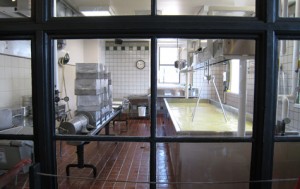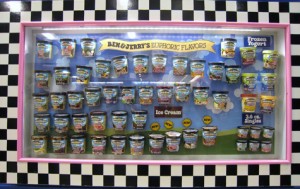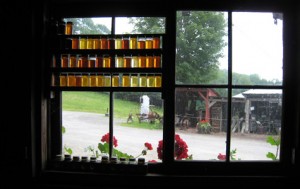Vermont Journal Day 4: What does it mean to be from Vermont?
July 8, 2010-(Tea Room, Inn at Shelburne Farms-Shelburne, VT)
For the past two days, I’ve focused a lot of my efforts on writing about the significance of the area in which I was staying, but I haven’t really talked a lot about Vermont itself. Before this trip, if you were to ask me what was in Vermont, I probably would’ve said…uh, skiing (question mark?)
How very wrong I was, and it just so happened that in the course of my search for what exactly made up Vermont “culture” I uncovered a lifestyle completely different from the laid-back, southern lifestyle I was so used to living in Virginia for all these years.
For one, Vermonters are very active, healthy, people. It’s immediately prevalent when you visit cities like Montpelier and Burlington that these people value the outdoors, and preserving their treasured wildlife. Biking, walking, and running trails are everywhere, both in the cities and the townships. Bike shops are everywhere too, and they certainly are not small. Even the towns of only a few hundred had a bike shop larger than the local car dealership.
In fact, in some places, it even seems like bike trails have taken a priority in the eyes of the city planners over cars themselves. And in other places, it almost seems as if Vermonters would have installed bike trails on the interstates as well if it weren’t for the fact that the federal Department of Transportation had rights over those.
Thus, it really isn’t that hard to bike from place to place, township to township in Vermont. Assuming one has the willpower and the muscle to do it, one could easily bike from one end of Vermont to the other using bike trails that have been painted on to all of the major state roads.
In fact, according to one Vermonter I had the pleasure of talking with, she truly believed that for the most part, if they had a choice, most Vermonters would bike from point A to B instead of using a vehicle.
Now, I found this interesting, especially in the case with the College of William and Mary and Williamsburg. Cyclists both around the area and at W&M have constantly been advocating a need to change Williamsburg into a more cyclist friendly road. But it wasn’t until I saw cities like Burlington where bikes take priority over emission producing cars where I realized for the first time what exactly it meant to be a “bike-friendly” town.
Williamsburg can certainly take a few notes from towns like Burlington and Montpelier that have established trails that make it easy to travel from point A to point B. I’m sure that within a couple years, they’d find that the city would become both greener, healthier, and as a result, happier too.
But then again, I guess I shouldn’t be too surprised at the activeness of Vermonters. They live in an region of the country where being active just comes with the job. The rock climbing, skiing, snowshoeing, kayaking, cycling, running activities are quite literally in their backyards.
Thus, in the absence of surprise, one can only help but be awed by how different, and (quite frankly relatively lazy) Virginians are in comparison. If you live in Virginia, just think about how many times a day where you didn’t have to drive somewhere. I don’t know about you, but for me, I have to drive at least 10 minutes for the nearest supermarket on a highway that’s barely wide enough to fit 3 lanes, let alone a bike.
The other thing about Vermonters that I feel makes up a great part of defining who they are is their immense pride and support of buying local. And I don’t mean simply local produce from farmers, I mean everything.

One of the products that Vermonters love to buy local are dairy products. Here is an example of a small cheese farm mixing the milk to prepare to turn it into curd and whey.
This is a movement that’s only begun to take shape in Virginia through the use of farmer’s markets and the like, but a majority of us in Virginia still like to buy our goods from the local supermarket who may have imported the product from god knows where? (9 times out of 10, wherever’s cheapest)
And it’s not entirely our fault as buyers either. There really isn’t much to choose from in terms of local products in Virginia, maybe ham, peanuts, and the occasional cheese stick. We as a state really rely on imported goods and services from other parts of the nation.
But in Vermont, you can see the benefits of buying local with your very own eyes everywhere you turn. It’s part of what’s given Vermont-based companies their firm foundation by which they grew upon.
Ben and Jerry’s ice cream, Burton Snowboards, Cabot cheeses, Lake Champlain chocolates, Green Mountain coffee, company brands you see everyday grew to where they are today because a small state populace absolutely is obsessed with supporting local small-businesses.
And Vermont’s an excellent example of where the ultimate goal of buying local has been achieved: when companies who have gotten huge in the world finally look back and help the local small-businesses and farmers

Ben and Jerry's is a great example of one of a local Vermont company that grew into a global corporate giant through tremendous local support.
themselves prosper.
Take Ben and Jerry’s for instance. Their fame was reached in large part because of humongous support from the people of the state of Vermont. As a result, now, as a world-renown corporation, it has made giving back to the community one of its three core mission statements. In addition, every bite of the ice cream you love, is made from the milk of thousands of Vermont dairy farmers who have pledged to keep their milk hormone free. We as consumers get better ice cream, Vermont-based Ben and Jerry’s continues to be able to support the local agricultural community. A win-win situation if you ask me.

Morse Sugarfarms is a small local farm that sells pure 100% Vermont maple syrup and is one of the few farms that still does so in the state.
Or take Burton Snowboards, a company that changed a whole industry around the world with its products. But at first, the company was as grassroots as it could be, peddling their wares to local Vermonters. It wasn’t until local Vermont ski resorts, with convincing from Burton Snowboards founder Jeff Burton, became one of the first in the nation to open up their lifts to snowboarders where the industry as a whole took off and ultimately, the success of the company.
It’s an amazing amount local support and buying local, not just agriculturally, that really sets Vermont apart from other states I’ve been too. As a result, you get an amazingly, almost mind-boggling amount of successful small businesses and the ability of restaurants to create an almost 100% organic and local menu, something that very few Virginia restaurants can boast.



No comments.
Comments are currently closed. Comments are closed on all posts older than one year, and for those in our archive.